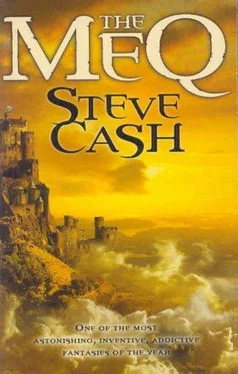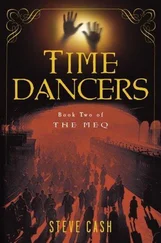Steve Cash - The Meq
Здесь есть возможность читать онлайн «Steve Cash - The Meq» весь текст электронной книги совершенно бесплатно (целиком полную версию без сокращений). В некоторых случаях можно слушать аудио, скачать через торрент в формате fb2 и присутствует краткое содержание. Год выпуска: 2005, Издательство: Del Rey, Жанр: Фэнтези, Детективная фантастика, ya, на английском языке. Описание произведения, (предисловие) а так же отзывы посетителей доступны на портале библиотеки ЛибКат.
- Название:The Meq
- Автор:
- Издательство:Del Rey
- Жанр:
- Год:2005
- ISBN:нет данных
- Рейтинг книги:4 / 5. Голосов: 1
-
Избранное:Добавить в избранное
- Отзывы:
-
Ваша оценка:
- 80
- 1
- 2
- 3
- 4
- 5
The Meq: краткое содержание, описание и аннотация
Предлагаем к чтению аннотацию, описание, краткое содержание или предисловие (зависит от того, что написал сам автор книги «The Meq»). Если вы не нашли необходимую информацию о книге — напишите в комментариях, мы постараемся отыскать её.
The Meq — читать онлайн бесплатно полную книгу (весь текст) целиком
Ниже представлен текст книги, разбитый по страницам. Система сохранения места последней прочитанной страницы, позволяет с удобством читать онлайн бесплатно книгу «The Meq», без необходимости каждый раз заново искать на чём Вы остановились. Поставьте закладку, и сможете в любой момент перейти на страницу, на которой закончили чтение.
Интервал:
Закладка:
I started out making my rounds with the goats at a good distance from the pass itself. Gradually, daily, I let the goats stray closer and closer. I was in luck. The sentry who was posted to the northern pass was not hungry or angry, far from it, but he was lonely and one day called out to me. I played mute, waving my arms and making hand signals. He took pity on me and we struck up a friendship, of sorts. He did all the talking and I nodded my head. To keep him talking, I often brought tobacco and dates, things I kept with me for trade, but never imagined would be used as bribes for information. In such a fierce and friendless place, they were better than my gold.
He was named Idris, after Idris Alooma, the sixteenth-century ruler who brought firearms to the Maghreb. This Idris was heavyset, which was unusual in the desert, and I never saw him look at his rifle, much less use it. He was jolly and gregarious and he still had a small spark of innocence left in his eyes, though he was anything but innocent. He had killed many men. Death, especially as a warrior for Mulai and Jisil, was common to him. He could slit a man’s throat and still take time to sample the dates the man had been about to swallow. He would fondly remember the dates, never the man.
He spoke a common Berber dialect, which I understood, not the difficult archaic speech of the camel drivers. Since I always brought gifts and never spoke back, he encouraged my visits and even used his hands more for expression, as I did. When I pointed at my eyes with two fingers and made a fluttering motion with my interlocked hands, imitating a bird, a “bluebird,” he shut his eyes and waved his hand across his face, telling me this must not be seen, not be discussed. It was a forbidden subject. I knew that no female, more specifically a female slave, would have become a forbidden subject unless the chief or chiefs had made it so. Star may not have known she was the daughter of Carolina Covington, but her blood did.
I began staying longer, returning sooner, and generally becoming a friendly nuisance until I was virtually living at the pass with Idris. He showed me hundreds of caves in the area and most of them were decorated with paintings and engravings from ancient times. Idris had no idea who had put them there or what they meant, but he pointed out that some of the older engravings were of animals that now only existed in the south — rhinoceroses, giraffes, elephants, crocodiles, hippopotamuses. In Berber, he said, “Many rivers, long ago.” Most amazing was a cedar tree near one of the caves, its limbs spread and twisted, reaching fifty feet up and out between two rock walls, rooted in what was the riverbed, maybe three or four thousand years ago. It was still alive.
I began sleeping in the tree. There was a crevice in a gnarled limb where I could stretch full-length and even watch Idris as he kept his watch in the pass. He did little. There was little to do. No one came through the pass in either direction for weeks. Idris said sometimes the sentry of the northern pass could live through the entire length of his watch and never see another human.
I waited, watched, and listened. My Meq “ability” to hear at great distance increased dramatically the first night I slept in the old cedar tree. I was learning to focus, turn it on and off, and even listen in my sleep. It was more than an increased intensity of a sense. It was more like another one.
It was during this strange sleep-listening on the night of a new moon that I first heard the horse of Jisil. Idris confirmed it for me the next day, nervously, because Jisil had been alone and this was never done. Somehow, I had known it was Jisil when I heard the hooves. He stopped for only a moment in the pass, so Idris could recognize him, then headed north at a full gallop. Three nights later he returned. He was alone again and charging hard back to his camp. I was worried. Something urgent was driving Jisil, but it was still weeks before the season Mulai’s camel driver had spoken of, the season the “bluebird” would be sold.
The next day I stayed close to Idris and the pass. Around sunset, I gave him the last of the dates and herded the goats back to my camp. I fed the donkey and the camels and climbed up into my perch in the coiled limb of the old cedar. As the Milky Way spread itself overhead, I watched Idris sit by his small fire. His silhouette was the only thing that moved in all directions. Then something began to happen. Something that proved forever what Sailor had told me years before. “Chase a whisper,” he’d said, “and you will find the wind.”
I heard a sigh. I turned my shoulders toward the source of the sound and I was staring into empty space. At first, it seemed to come from space itself, from somewhere near Sirius, the Dog Star. I waited and listened for it to come again, but it did not. My eyes drifted to the rock face opposite the cedar and just beyond the farthest outstretched limb. The moon cast light and shadow against the stone at precisely the right angles for me to see something I had never seen in the rock face before — an opening.
The sigh returned and doubled in strength, then tripled. It was as if one sigh had found a gap in the silence and the others were following, curious and crowded behind each other, anxious to come through and spill out from wherever they were. And they were all coming from the opening, which was forty feet up the rock face and fairly small, so that only a child could enter without difficulty.
I put some candles in my pocket, climbed down from the cedar, and made my way across the ancient riverbed. In the dark, scaling the sandstone cliffs would usually have been impossible, but once again, because of the angles of light and shadow, I was able to see footholds and handholds clearly. I climbed slowly and surely toward the opening. The sighs had become so numerous they seemed to flow like water from a spring or fountain.
I found a ledge that ran in front of the opening. It was very narrow and could have been invisible from the ground. I lit a candle. I peered into the black space of the opening. The air was dry, as dry and light as ashes. The opening itself was no more than three or four feet high and wide. I followed the sound and flow of the sighs.
The passage wound into the mountain and gradually increased in height, but remained narrow. The walls were smooth and as I ran my hand over the stone, I could feel engravings at different points along the way. I shone the light on several and they were all in languages and symbols I had never known or seen before. The sighs sounded more and more like water.
Abruptly the passage ended. There were no other ways in or out, only the one narrow passage that ended in a domed stone room in the natural shape of an oval. I set one candle down in the sand and lit another. The walls were covered with more engravings of symbols and animals, some of which I knew were extinct. At the narrow end of the oval there was a dark opening in the stone that was the source of the sighs. Water was flowing from it, clear and sparkling, disappearing into the sand where it fell.
I was suddenly thirsty. I had to drink from that water. There was no other thought as strong. I walked toward the dark space and the water and knelt down and bent forward, placing my palms against the stone on both sides of the fountain. I opened my mouth for the water, closed my eyes, and leaned into it.
But there was no water.
I opened my eyes and the dark opening that had been the source of the water and the sighs was actually a circle in the stone, indented and stained black, and my palms were not in some random resting place against the stone. I had unknowingly put them in handprints exactly my size that had been there for millennia, carved or worn into the stone in exactly those positions. I leaned back and looked at the wall. Around the black circle and engraved in a language I had never seen written, but understood intuitively, were two intersecting lines. They were written in Meq. The script Eder told me we had lost, the script that had been scrawled into the bone barrettes she wore in her hair. Translated, they read like this:
Читать дальшеИнтервал:
Закладка:
Похожие книги на «The Meq»
Представляем Вашему вниманию похожие книги на «The Meq» списком для выбора. Мы отобрали схожую по названию и смыслу литературу в надежде предоставить читателям больше вариантов отыскать новые, интересные, ещё непрочитанные произведения.
Обсуждение, отзывы о книге «The Meq» и просто собственные мнения читателей. Оставьте ваши комментарии, напишите, что Вы думаете о произведении, его смысле или главных героях. Укажите что конкретно понравилось, а что нет, и почему Вы так считаете.












